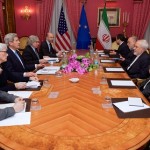United States President Donald Trump’s decision to unilaterally decertify the Joint Comprehensive Plan of Action (JCPOA) – the Iran Deal – was no surprise to Iranians and the international community. Withdrawal from it was one of the strange promises Trump had made during his presidential campaign, matching in eccentricity his Muslim ban, the Wall project along with the border with Mexico and the decision to negotiate with North Korea directly.
Earlier this week, Trump’s Secretary of State Mike Pompeo’s speech toughened the U.S. stance on Iran. Some of the “sweeping changes” that the U.S. has sought include Iran’s agreeing to pull out of the Syrian war, reducing its interventionist role in Lebanon and Yemen and dropping its ballistic missiles programme.
Pompeo’s remarks and Trump’s appointment of John Bolton as the National Security Adviser have given sceptics reason to think that the United States is after “regime change” in Iran, economic sanctions being a precursor to more serious and fundamental moves.
This will most certainly hit Iran’s economy, foreign relations and the lives of its citizens. But it will also impact other countries from the West, which are the U.S.’ allies.
Companies from the European Union, chiefly Britain, France and Germany which have been trading briskly with Iran since the day the nuclear deal was implemented (16 January 2016), will face difficulties once Trump reinstates economic sanctions. It will limit their ability to engage with Iran and set out penalties for such trades.
Iran is an oil-rich country, and if it’s not able to sell its crude to serious trade partners in Europe or regular customers, such as China and India, the average Iranian will be hurt. Small and Medium Enterprises (SMEs) will do less lucrative business, and wages for mid-ranking government employees and their ilk will be delayed or lower than usual.
Efforts to diversify Iran’s oil-dependent economy have not been successful due to the state’s monopoly over economic affairs. For example, President Hassan Rouhani’s encouragement of investment in tourism and non-oil exports worked during his first term in office, but now, the country is under constant pressure over the nuclear deal, being vilified in the American media and is on the verge of international isolation again. This drives investors away and paints a grim portrait of the nation to the outside world: French oil giant, Total, recently halted a multibillion-dollar gas project in Iran.
The inflation rate is one of the highest in the developing world and West Asia partly due to the nuclear-related sanctions that have crippled the economy and detached the country from the international banking and financial sector.
Iran’s foreign relations too have taken a beating: the deal was, after all, the outcome of two years of active diplomacy between Iran, the six world powers and the European Union. Scrapping it will erode the trust and goodwill these nations built up and the resources they put into securing the JCPOA.
The JCPOA became a bedrock for nuclear non-proliferation, preventing further instability in West Asia. It was also one of the best examples of the international community saying no to isolationism and warmongering. Former president Ahmadinejad’s ideological inculcations 10 years ago made Iran’s quest for nuclear energy a national security matter largely: his message was that nuclear technology was an imperative need for his country and the world had no business to investigate or question it. Ahmadinejad’s hardline allies in different sectors of Iran’s government and state colluded with him to make this nuclear programme a Forbidden City nobody could touch or criticise. Its cost was the economic welfare and security of his people. When the JCPOA capped this nuclear programme in return for international sanctions relief and new openings for the people, it was a victory for the reform movement, headed by Hassan Rouhani. Its breakdown will be a blow to his credibility as well.
Two-term president Rouhani’s administration will now have a tougher job, selling the deal to the hardliners at home, who have no clear understanding of nuclear non-proliferation, diplomacy or the slightest appreciation of national interests, but are significantly powerful and vocal. The deal’s withdrawal will undermine the additional efforts underway to keep Iran’s economy thriving and moving forward. It will all translate into the incapacitation of the diplomatic efforts of Rouhani’s dexterous foreign minister, Javad Zarif, to secure the nuclear agreement. Rouhani has now asked Zarif and the nation’s diplomatic apparatus to work with the remaining parties in the nuclear agreement, i.e. Britain, China, Germany, France and Russia, to ensure that the economic benefits of the Iran deal continue to accrue to the people.
EU Commission President Jean-Claude Juncker has mentioned that the EU will reactivate the “blocking statute” against the U.S. sanctions on Iran to protect European firms from the impact of U.S. penalties and restrictions and give them the chance to do business with Iran freely. This is what Europe had done in 1996 to circumvent Washington’s trade embargo on Cuba.
The European Union is working with Iran to ensure this important international agreement and its spirit are preserved, but India, China and South Korea will also need to continue to compete to win Iran’s oil market in Asia. Such actions will help temper the corrosive effects of the U.S.’ latest hit at Iran.
Kourosh Ziabari is an award-winning Iranian journalist, media correspondent and peace activist. He is a regular contributor to Gateway House.
This blog was exclusively written for Gateway House: Indian Council on Global Relations. You can read more exclusive features here.
For interview requests with the author, or for permission to republish, please contact outreach@gatewayhouse.in or 022 22023371.
© Copyright 2018 Gateway House: Indian Council on Global Relations. All rights reserved. Any unauthorized copying or reproduction is strictly prohibited.


